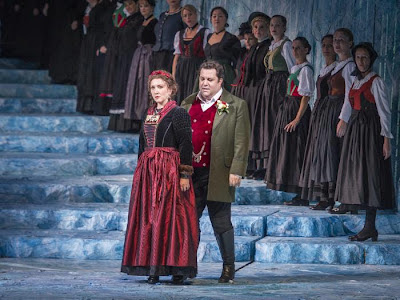Road Show: Lisbon
JOHN ALLISON takes a look at the history of opera in the Portuguese capital — and the state of opera there today.

© Gregory Downer 2012
|
"What a day, what a day, for an auto-da-fé! What a sunny summer sky!" It goes without saying that the Lisbon depicted in Candide — Bernstein's as well as Voltaire's — is a very different place from the city that today counts as one of Europe's most enchanting capitals. Indeed, it changed radically and catastrophically on the very day Voltaire was prompted to recount: no "sunny summer's day," it was All Saint's Day, November 1, 1755, when the Great Earthquake struck and was felt as far away as Jamaica. On that morning, most of the population was at Mass, and many who made it down to the seafront to take refuge from falling buildings were swept away by the resulting tsunami.
There was even an operatic casualty. The 600-seat Casa de Opera, situated near the royal palace and the banks of the Tagus river, had been open for only seven months when it was destroyed. (It had been inaugurated on March 31, 1755, withAlessandro nell'Indie, by David Perez, King José I's mestre de capela.) To judge by engravings of the ruin, it was a handsome building. When the city finally picked itself up again, opera performances were given in a variety of theaters, but the Casa's greatest and most enduring successor — the Teatro Nacional de São Carlos, still home to opera in Lisbon — was opened in 1793.
Attending a performance at the São Carlos today, in its exquisite five-tiered rococo auditorium, which currently seats around 850, may be one of the most overlooked pleasures of European operagoing, but one doesn't have to have had the privilege to picture the scene. With its neoclassical façade opening onto a little square in Lisbon's affluent Chiado quarter, it seems for nearly 220 years to have been a constant focal point of city life, and as such it is well documented in the pages of Portuguese literature. It crops up atmospherically from time to time as a backdrop to the bourgeois life drawn so piquantly in the great realist novels of Eça de Queirós.
With a performance schedule that is not exactly intense, the São Carlos leaves opera-lovers time to explore a fine eighteenth-century city (the legacy of that earthquake), laid out elegantly within a triangle of hills. There are still remnants of the pre-quake Lisbon, none more spectacular than the Mosteiro dos Jerónimos at Belém, a masterpiece of the exuberant "Manueline" architectural style named in honor of Manuel I, who ruled (1495–1521) at the apogee of Portugal's seafaring power. The monastery is built on the site where Vasco da Gama (who makes an appearance in Meyerbeer'sL'Africaine) spent his last night ashore in prayer before setting off to round the Cape and sail to India. This voyage is celebrated by Luís de Camões in his epic Os Lusíadas (The Lusiads); the towering poet himself puts in an appearance in Donizetti's Dom Sébastien, the grand opéra that anticipates Don Carlos. Dom Sébastien tells of how King Philip of Spain's nephew, Sebastião, crippled the proud seafaring nation with a disastrous crusade against Morocco.
Despite its touchy subject, Dom Sébastien was seen at the São Carlos in 1845, only two years after its premiere, and much other opera history has been made there. The theater is cozy yet capable of holding almost any work, including Wagner, though the composer's most recent appearances here have not involved the pit. In his radically-conceived Ring, staged in annual installments between 2006 and 2009, Graham Vick turned the theater back-to-front and (as it were) inside-out, putting the action on a platform built over the stalls and ranging the audience around in the theater's boxes and even on the regular stage. The in-the-round approach, allowing the audience to get unusually close to the performers, was made possible only through the vision and commitment of then-intendant and artistic director Paolo Pinamonti, an Italian who left in 2007 when the government set up the administrative body OPART, fusing the opera and ballet companies and forcing the former to absorb the latter's debts.
Since then, CEOs have come and gone, and so has Pinamonti's artistic successor, German stage director Christoph Dammann. British conductor Martin André is now at the artistic helm, and the 2011–12 season (the first he has planned) is a good example of his vision. It opened in October with a new production of Don Carlo and includes such intriguing fare as a double bill of Busoni's Turandot and Rachmaninoff's Francesca da Rimini alongside rarities by Montsalvatge and Marcos Portugal. Nevertheless, the theater often appears to be muddling on and is always in danger of being treated as a political football. State funding commitments in Portugal have always been disclosed later than in most European countries, making advance planning (and the booking of international artists) difficult.
Opera may never have had the easiest time here, yet in a city where the twin impulses of poetry and song run so deep, it is unthinkable that it should disappear. It's not a far walk from the São Carlos up to the fado bars where the spirit of Amália Rodrigues lives on. Evoking a peculiarly Portuguese strand of fatalism — saudade — this is music that could only have evolved in a city perched on the edge of Europe. The same can be said of the melancholy poems of Fernando Pessoa, whose literary review Orpheu — which he founded to introduce modernism to Portugal — carried deep musical resonance in its very title. In the words of George Steiner, all Pessoa's writing "gives to Lisbon the haunting spell of Joyce's Dublin or Kafka's Prague." 
JOHN ALLISON is editor of Opera magazine and chief music critic of The Sunday Telegraph

























